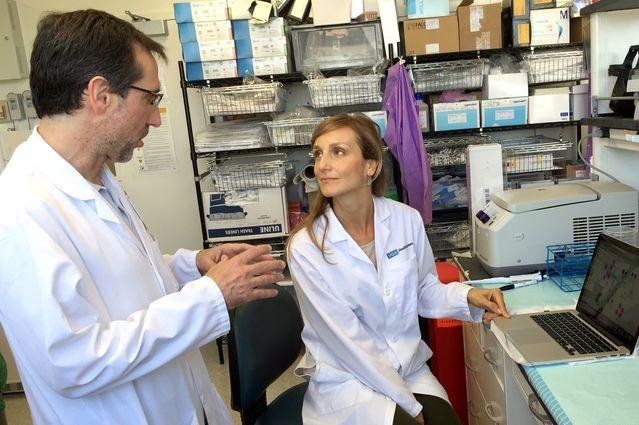Dr. Antoni Ribas, at left, and Dr. Helena Escuin-Ordinas report in a new study that the cancer drug vemurafenib may be useful for wound healing. Photo by Peter Bracke/UCLA
LOS ANGELES, Aug. 1 (UPI) -- A drug used for melanoma may have the ability to speed wound healing, though researchers say much more research is necessary before it could be employed for that use with patients.
The melanoma drug vemurafenib, marketed as Zelboraf, activates proteins in skin, which researchers at the University of California Los Angeles say holds promise for accelerated wound healing.
Vemurafenib one of several newer cancer drugs called BRAF inhibitors, blocking the effects of a mutated gene involved with cell signaling that has become a key target in treating cancer.
Researchers at UCLA spent the last three years investigating whether one of its side effects, paradoxical activation of MAPK, protein kinases that respond to stress in cells, could help motivate the restoration of the barrier layer of skin.
"Finding a cure for acute and chronic wounds remains a worldwide challenge," Dr. Helena Escuin-Ordinas, a researcher at UCLA, said in a press release. "Topical BRAF inhibitors hold great promise to promote skin recovery, not only after injury such as from abrasions, ulcers or surgery, but in skin-related side effects that result from treatment for a wide variety of diseases, such as cancer and diabetes, where current therapies are not highly effective."
For the study, published in the journal Nature Communications, the researchers performed experiments to show the drug could induce the proliferation and migration of keratinocytes that help cell cycle progression, which could help speed skin healing.
The researchers found, using a topical application of vemurafenib, their theory on the drug's effects on regrowth of the epidermis, the outermost layer of skin, proved true in experiments with mice.
Before trials with humans can be conducted, the researchers say they need to develop more experimental models to study how the drug stimulates skin growth
"We set out to take advantage of our mechanistic understanding of these drugs and see if we could turn a side effect into a potentially beneficial effect," said Dr. Antoni Ribas, director of the Jonsson Comprehensive Cancer Center Tumor Immunology Program at UCLA. "These agents have great potential to be used to develop topical treatments to greatly accelerate wound healing."















